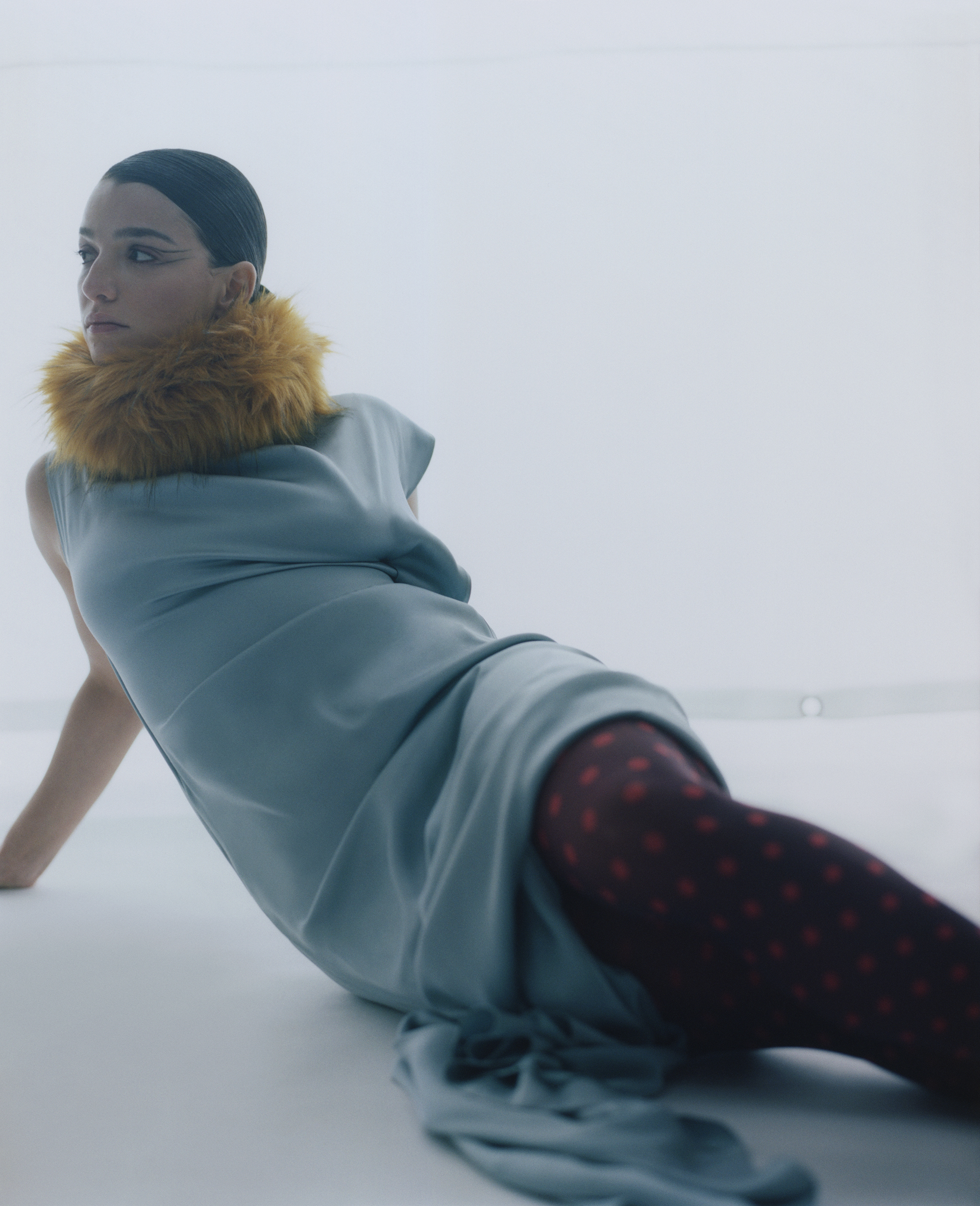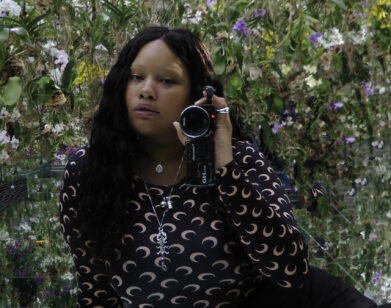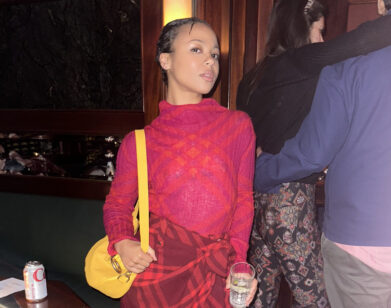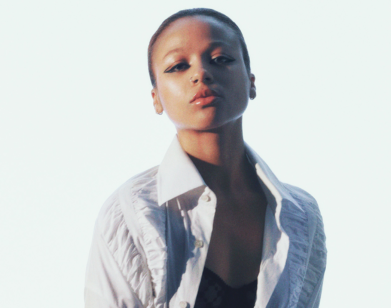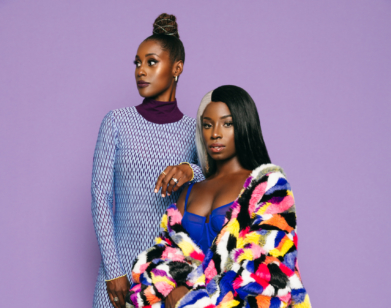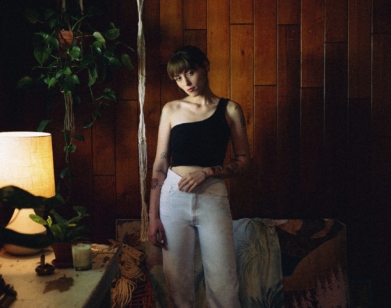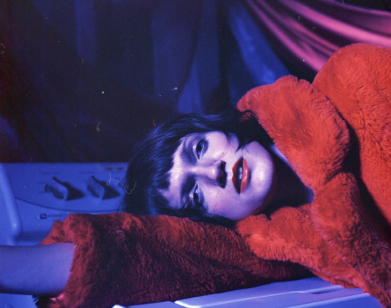AMY
Marisa Abela Tells Myha’la Herrold How She Found Amy Winehouse
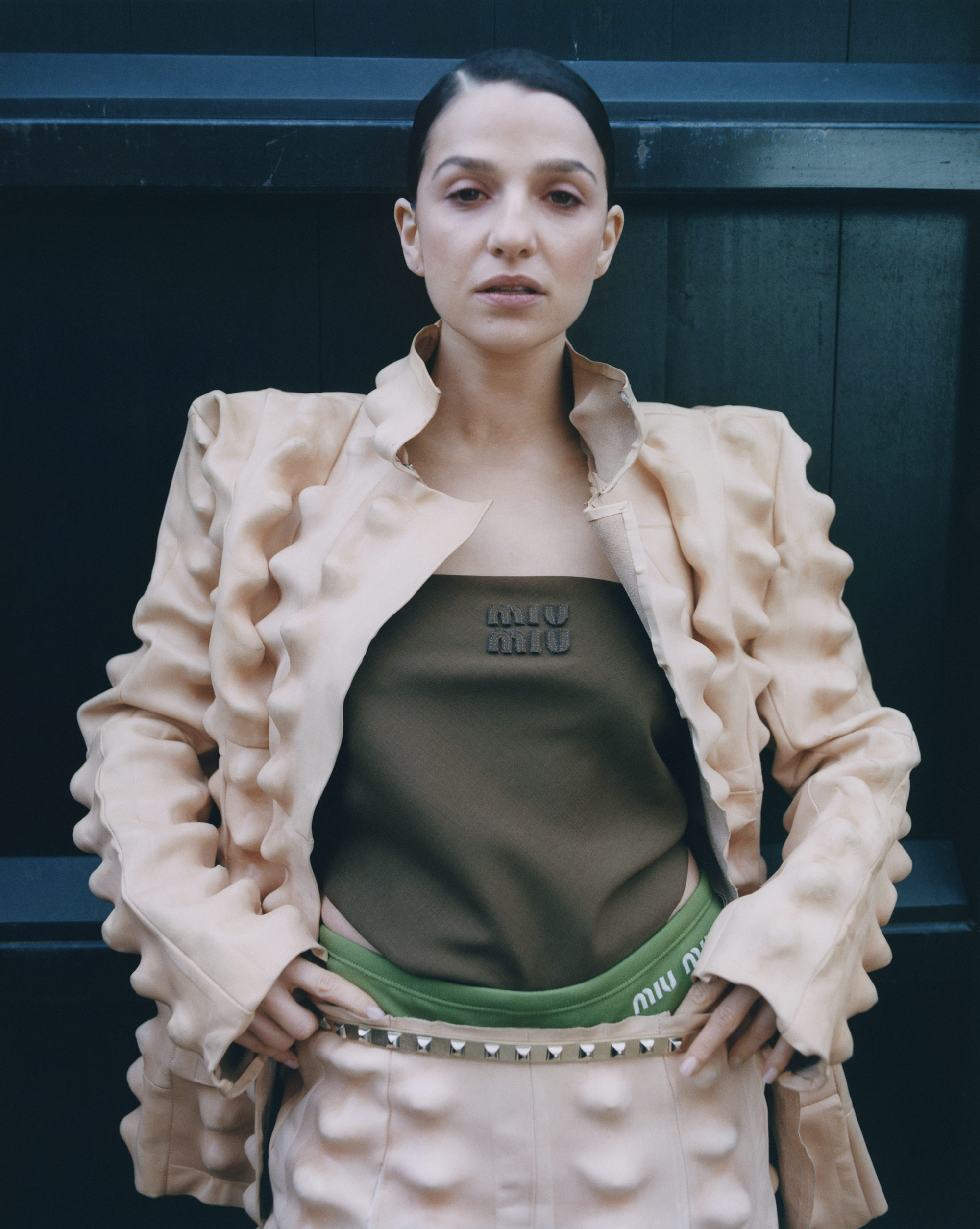
Marisa Abela wears Jacket and Skirt Qianhan Liu. Top and Underwear Miu Miu. Belt Fanci Club.
They asked her to play Amy Winehouse, and she said yes, yes, yes. After fending off considerable anxiety, Marisa Abela accepted the lead in the new biopic Back to Black, and jumped headfirst into the role of the late R&B icon. The 27-year-old British actor learnt Amy’s ways: the moves, the mannerisms, and yes, even the voice. Like the rest of us, her Industry costar Myha’la Herrold was dying to find out how she did it.
———
FRIDAY 3PM FEB. 23, 2024 LONDON
MYHA’LA HERROLD: Hey girlfriend!
MARISA ABELA: Hi baby, baby, baby! Oh my gosh, thank you so much for doing this.
HERROLD: Are you kidding me? Of course.
ABELA: This is so fun.
HERROLD: I hope it’s fun. I don’t know if I’m an interviewer, but I’m going to do my job.
ABELA: I just think it’s so nice that it’s you. I was like, “Can it be Myha’la, please?”
HERROLD: I hope everyone takes notes. Like, “You better do it just like this. You better be nice to my friend.”
ABELA: [Laughs] Yeah, exactly.
HERROLD: Okay, so I’m going to jump right in. How did you get the call for Amy?
ABELA: The call that I was auditioning, or the call that I got the part?
HERROLD: Both.
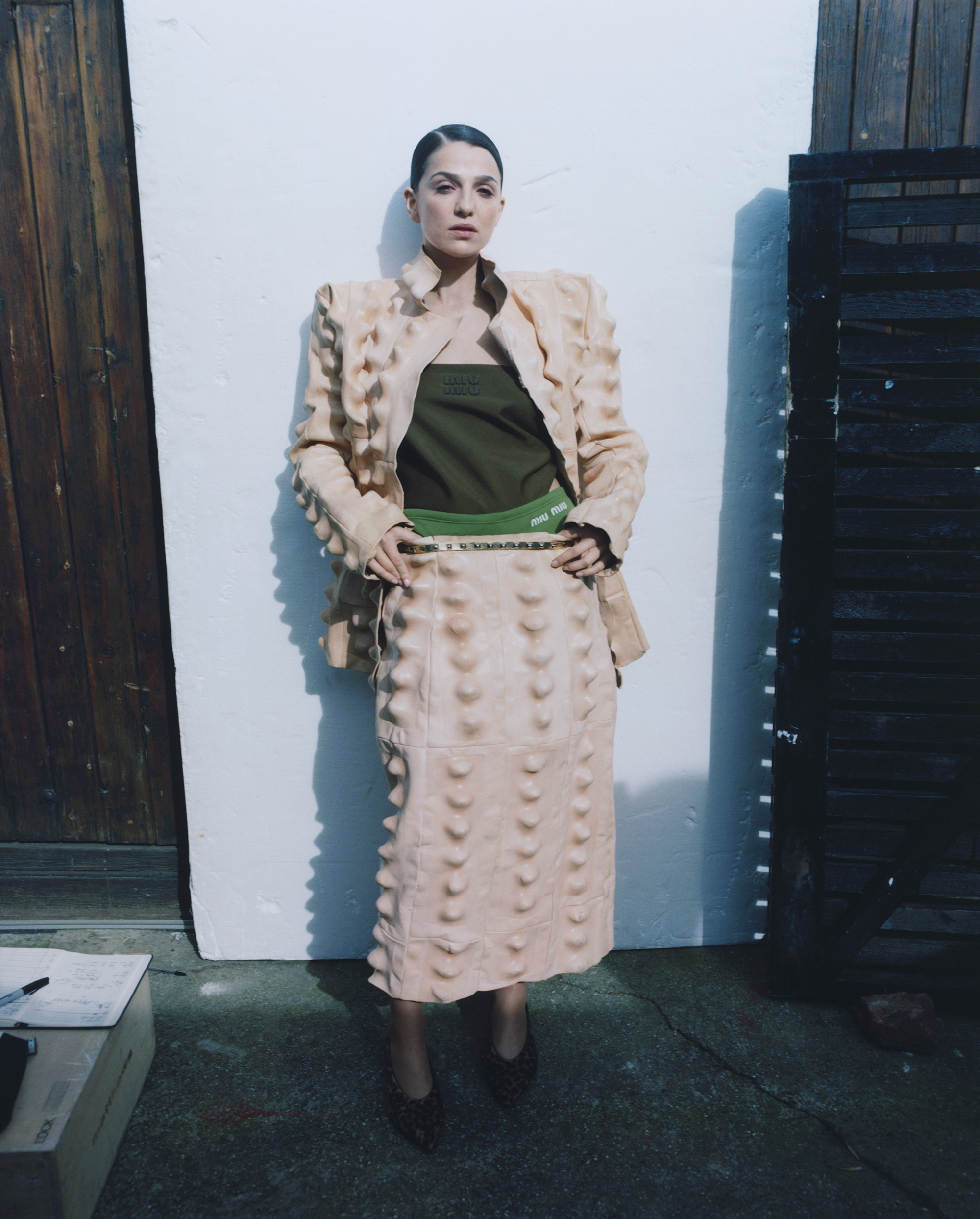
Jacket and Skirt Qianhan Liu. Top and Underwear Miu Miu. Belt Fanci Club. Shoes Isabel Marant.
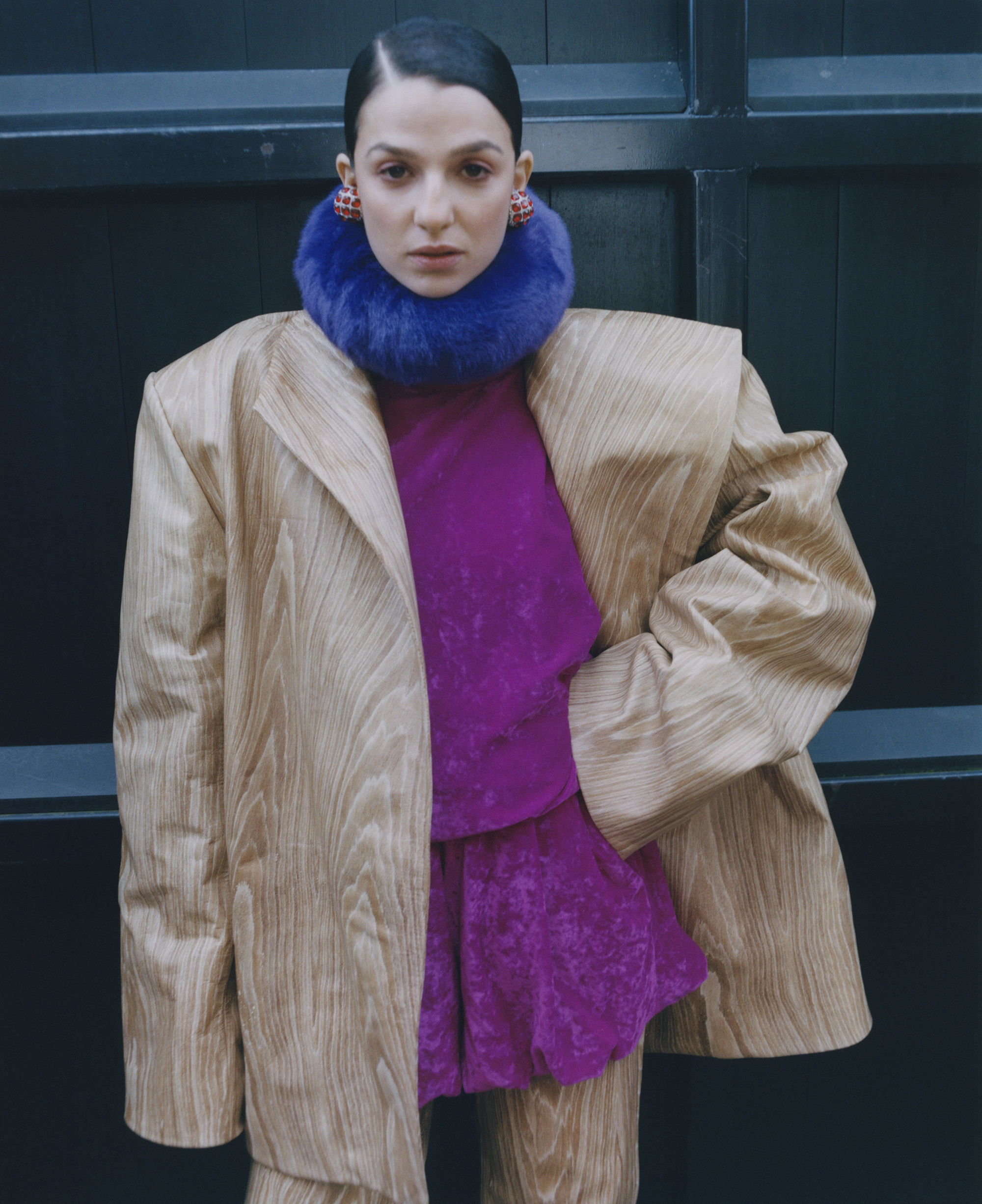
Jacket and Pants Qianhan Liu. Top and Skirt Isabel Marant. Earrings Stylist’s Own. Collar Lovro Lukic.
ABELA: With the call for the first audition, my agent rang me and said there was a meeting. My first instinct was, “I don’t know, this feels insane, like, huge and crazy. And I’m not sure that I could do that.” My agent was like, “Listen, the meeting’s in two weeks, so let’s say ‘yes’ and then take a week to really look into it. And if you still feel at the end that this is too much, then we’ll pull you out of it in enough time.” So in that week I watched loads of interviews with her, watched the Amy documentary again, and the documentary that her family had made, and read lots of stuff. And then I was like, “I don’t know, I feel like maybe I could do this.” Because the Amy that I knew before was the iconic version of Amy that everyone thinks about when they first think of her beehive and on the streets of Camden and I didn’t know what my way into that was. But when I started to think about her as a young woman at 17, 18, 19, 20, that girl, I was like, “I really feel like I know her.” It’s about understanding that core person, so I thought, “Well, that’s a good place to start, and at least a good place to go into a first meeting with.” So I did it. And then there were lots of auditions. For the call where I heard I got the part, I was at the Edinburgh airport, going to Ibiza with some friends. I got a call from [the director] Sam [Taylor-Johnson], and she was like, “You are our Amy.” I was so excited. And then as soon as I sat down on the plane and buckled my seat belt, I was like, “Oh my god.” And the whole flight I couldn’t speak. I remember I was like, “Listen, I’m going to have these few days to celebrate. Then as soon as we land back in London, I’m in.” And I was. From that point on I was in full boot camp mode.
HERROLD: Right. Because I remember when you told me, the initial thought was that the undertaking of that is the responsibility. And it’s not even, like, “Can you be in this movie?” Because, duh, obviously you can. It’s all of the rest of the shit around it. But then after you said, “I’m doing it,” I was like, “Fuck yeah, you are.” I genuinely do not know another person who could do this.
ABELA: Thank you.
HERROLD: Deadass. So serious.
ABELA: It wasn’t like the call was like, “Do you think we should make this movie?” It was like, “We’re making this movie and someone’s going to do this. Do you think you could?” And it wasn’t an instant, “Yep, sure, I’ll give it a good old go.” It was, “Well, let me really think about it and see.” Often you get those calls and it’s like, “Can you ride a horse?” And you go, “Yeah.” And then you’re like, “I’ll just take the lessons later.” But for this, I was as honest as I could have been, because I wasn’t going to cheat myself into getting this job and then not be able to get close to her. For the audition I specifically was like, “I’m going to go with my hair up, no makeup on.” I think all of the other girls went in with at least a nod to a beehive and an eyeliner. But I didn’t want to be like, “Oh, if I turn this way, the ridge of my nose can look a bit like Amy.” I was like, “If I can show you that I understand the essence of this woman and can get to a place where I can help people rediscover what it was that they fell in love with in the first place—her soul, her wit, her humor, her empathy, her lust for life, her artisanship—right now in this room with no hair, no makeup, then we’re onto a good start.” Because I never wanted this to feel like an impersonation. And there were things, as I started to learn more about her in my research, where I was just, like, “I know this, I’ve felt this.” Her energy, what she wanted out of being an artist. Yes, she wanted people to love her music, but the goal was to create something truthful and be respected for being good at what she did. And that made so much sense to me. There are videos of her saying things like, “If I could just be in the studio every single day, I would be.”So it was getting back to that, because it’s so easy to look at her story with the hindsight of everything else, but rediscovering this little girl from Camden who just had that voice and those things to say—I was like, “Yeah, okay, let’s go.”
HERROLD: Cut. Print. That’s the story! But I love that you said, “I went in with no makeup and no hair.” Because all of those things, somebody else is going to do that to you. It’s about integrity, which is exactly why, when you told me you were doing it, I was so scared, but also knew that there was no one else who could do it. So congratulations, love you.
ABELA: I love you.
HERROLD: You said something about “boot camp”—I want to ask about your experience working with the movement coach. And can you talk about learning her voice?
ABELA: You can’t do one thing with-out the other, and the day that I put the two together, everything started to work. For the singing, after I got the job, Sam said to me, “Don’t worry, it’s not a prerequisite that it has to be your voice. If it doesn’t work, we can merge your voices or we can find someone else who does Amy.” But Amy’s a singer, so I wanted to get to what that feels like. Even if it’s just to know how it feels to express yourself in that way, I wanted to get as close to it as possible. I like to sing, but I’ve never been a singer.
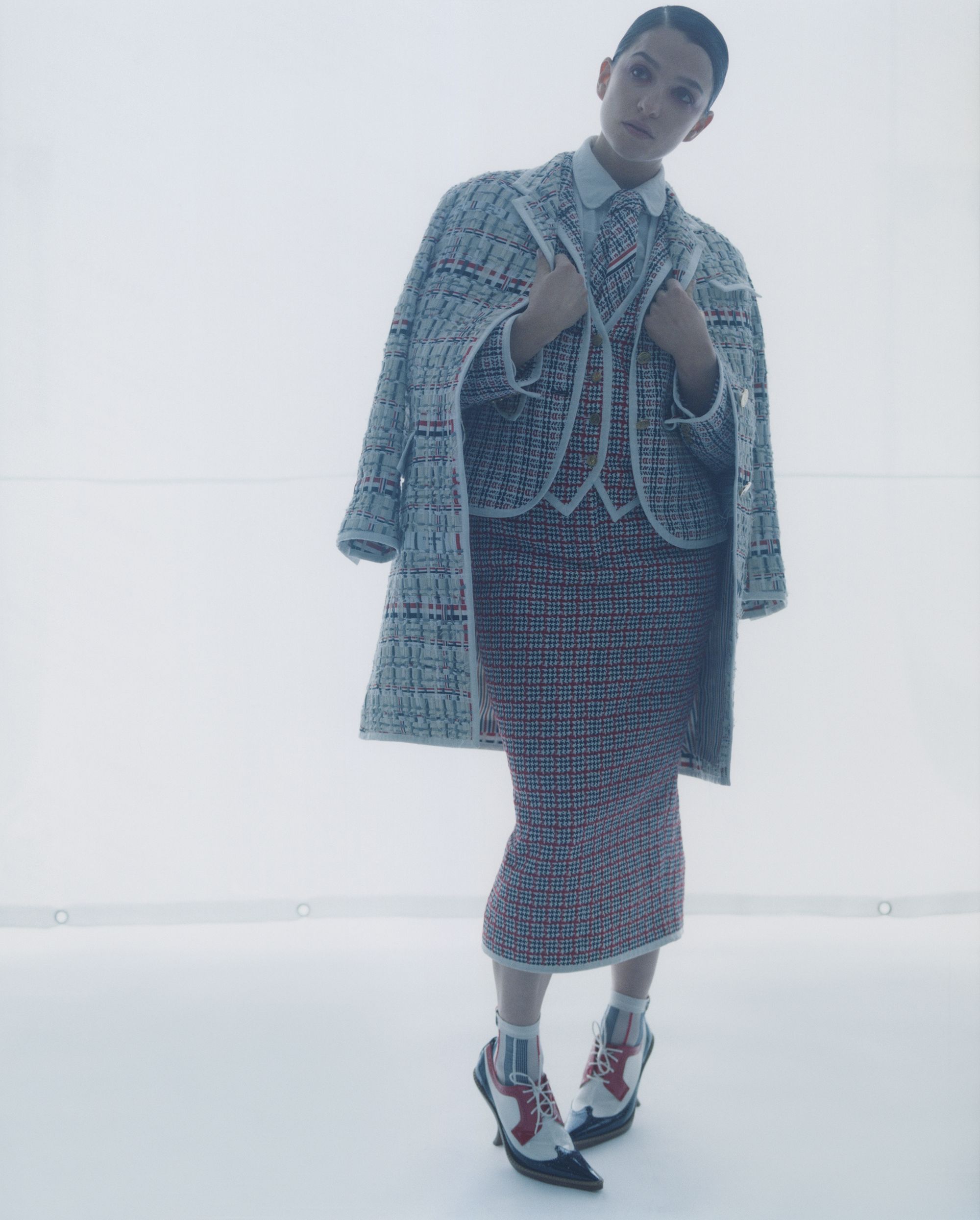
Coat, Jacket, Waistcoat, Skirt, Tie, Socks, and Shoes Thom Browne.
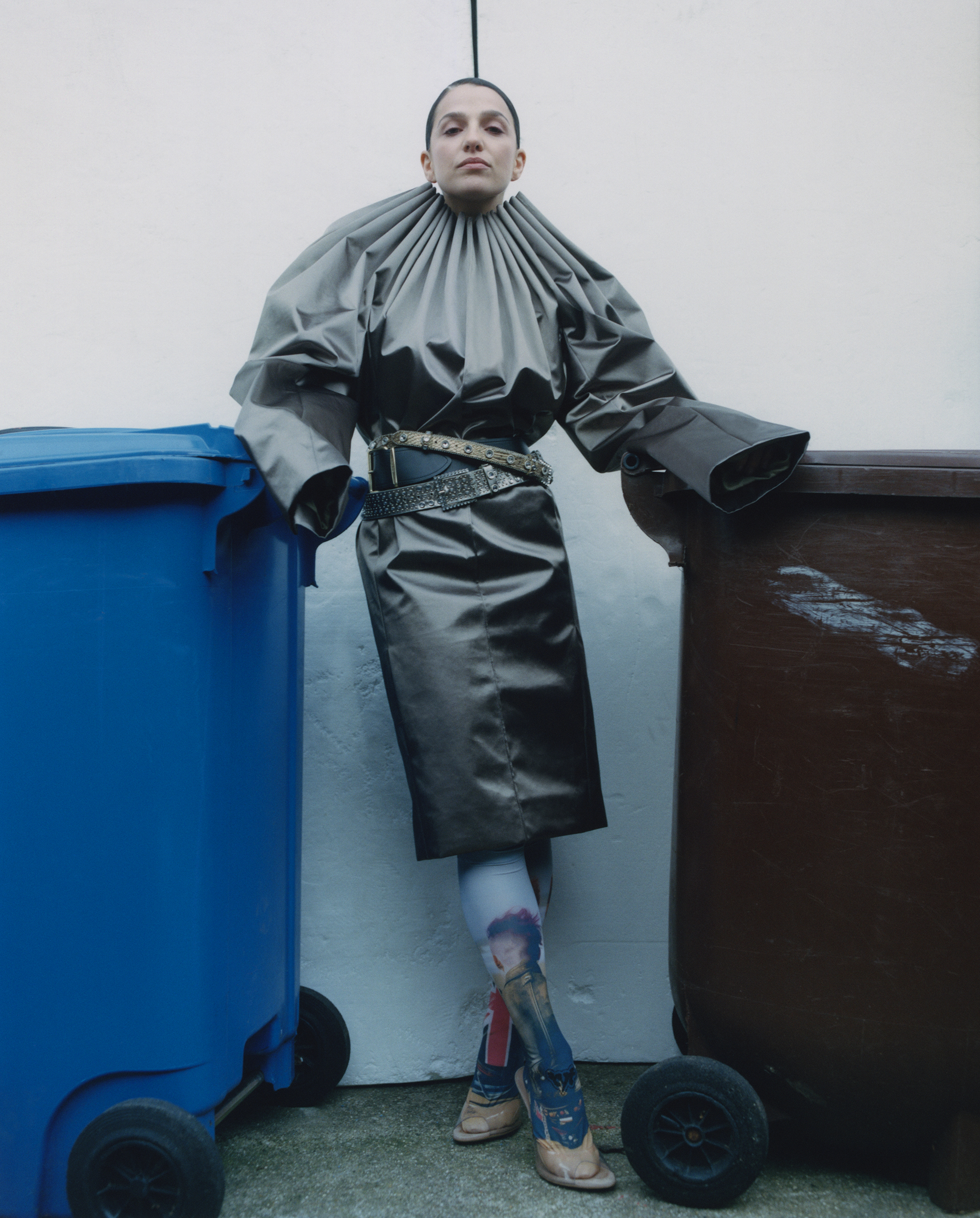
Dress Cecile Bousselat. Gold and Silver Belts Stylist’s Own. Black Belt Miu Miu. Socks TYT M8. Shoes Blumarine.
HERROLD: Oh bitch, but you can sing. People need to understand, Marisa can sing. It was just about this specific voice.
ABELA: For me, it was, “Who are her references?” That was the turning point. Before I started working with my singing coach, I was listening to Amy and trying to mimic it, but I didn’t know the place it really came from. So when I started working with my singing teacher, she said,“Take a break from Amy,” and the first thing we did together was go,“Okay, who was Amy listening to all her life?” So I was listening to Ella Fitzgerald and Sarah Vaughan and Dinah Washington, singing their songs over and over again in the shower, and listening to their songs whenever I got on the Tube. Then I started to listen to a bit more of doo-wop, like the Shangri-Las and the Ronettes. And then rap as well as, like, Camden music, which is a whole other thing. So all of these influences are just running around in my head, and suddenly Amy’s voice started to make more sense. Once I got to a good place with that, it was about, “Okay, and then how does Amy use her voice? What resonances does she use?” At the beginning, I thought it was a raspiness. It’s not. It was a mixture between a really intense nasality and a super chesty low voice. So, I did two hours of singing a day every day for three or four months. But to me, the movement was the thing that really brought me to Amy’s soul and character. When she was younger, Amy had these big boisterous movements because she was greener. Also, her references at that time were more rooted in hip-hop. Then later on when she’s done Back to Black and she’s more influenced by romantic girl bands, like the Ronettes, her movements are much smaller. But you know what it’s like—we went to drama schools. People would say,“How did you do it that intense amount of time?” And it’s like, “Try a three-year BA in acting!”
HERROLD: I’m waiting for the role or project where I get to exhaust all of my training. Where I go back to my Laban [movement analysis] and all of that stuff.
ABELA: I went back to Laban and I was like, “Okay, so from 17 to 21 she’s punching, wringing sometimes.” It’s so nice to be able to say, “I’ve learned this.” You’re using all the tools in your arsenal. And then, when I’m performing as Amy onstage, that’s a whole other thing, because then it’s live theater all of a sudden.
HERROLD: Can you tell the story of that particular day?
ABELA: When we were doing Glastonbury? Well, there was a 2008 performance at Glastonbury that Amy did, and we were recreating it. I was singing “Me & Mr. Jones,” and I’d learned it completely as she’d done it. All of the choreo, which wasn’t choreo, it was just her running around like crazy. At the beginning she asks someone to get her down because she wants to be in the crowd, so we did the exact lift that she does. We planned it all out, and then everyone comes in and it’s like 400 extras, but you have to shut your Marisa brain off and just do it. So we get up there and they said, “Listen, maybe we could do the first one with just the track on and you miming and we’ll film the crowd first so you can warmup into it.” And I was like, “No way,”because the crowd is as much a part of this scene as I am, so I want to get them excited. In this scene, once I finish the crowd are all chanting,“Amy! Amy! Amy!” So we begin the first take—music starts, I go down, do the whole thing. And the crowd is doing it. Then it cuts and it goes silent. But then the crowd starts going crazy again. And Sam comes on stage and is like, “I just want you to know, Marisa, she’s worked so hard. This is all her, it’s all live.” And then they start chanting my name.
HERROLD: “Marisa! Marisa! Marisa!” That is so sick.
ABELA: It was weird because often onset I would try and stay, not in character, but I wasn’t on my phone texting my mom, you know? And so then for that to happen, it suddenly slips you back into, like, “My job right now is wild. The fact that I’m actually doing this is crazy.”
HERROLD: I love those moments. Because we are going, going, going all the time, and you’re super focused. And then when something like that happens, you get to zoom out for a weird fucking second, and it’s like, “How cool that I get to do this.”
ABELA: Totally. Because you’re there to serve something else, so then for people to remind you that you are a person called Marisa and you exist—to be humanized again suddenly in that moment—is so jarring, but really amazing.
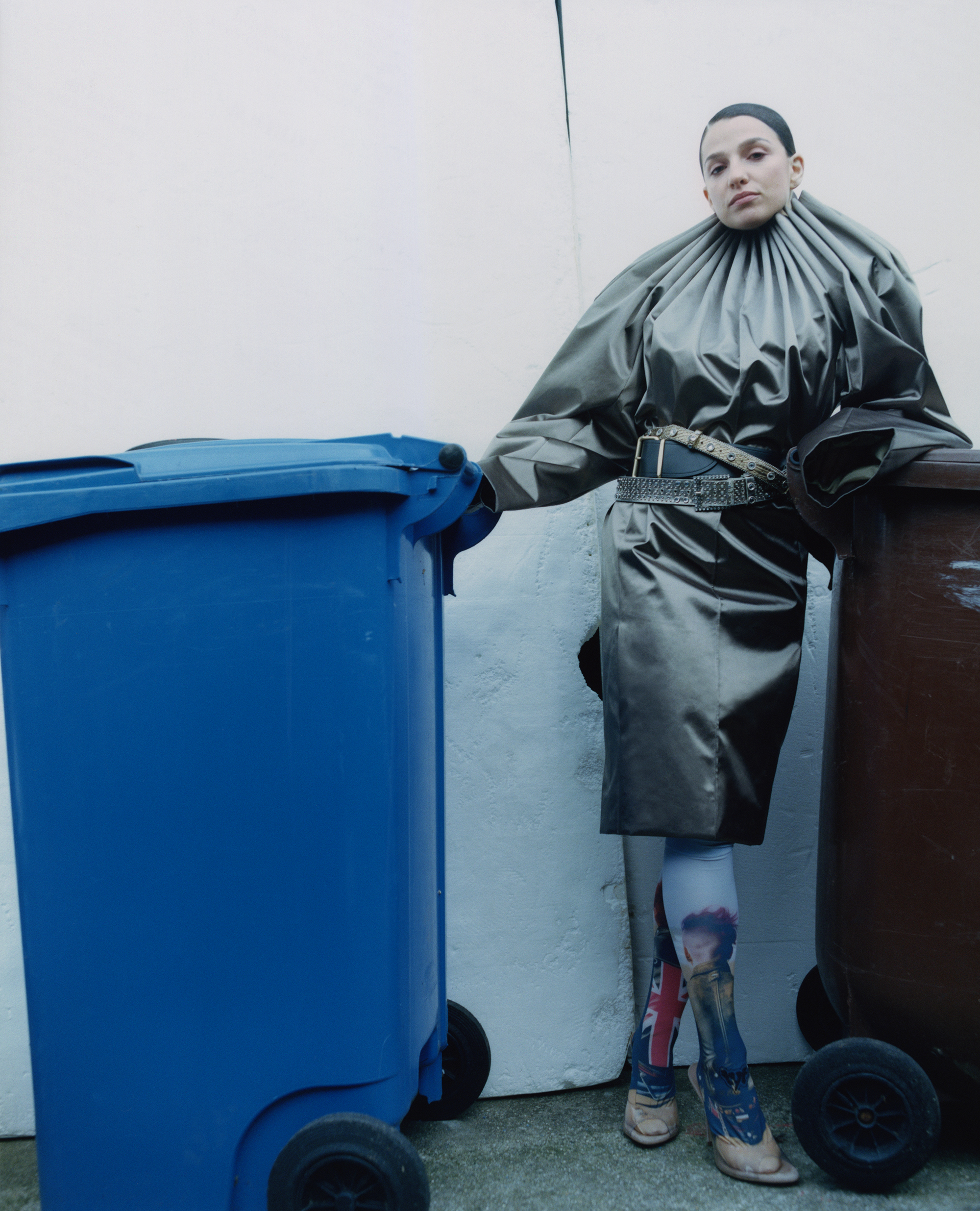
Dress Cecile Bousselat. Gold and Silver Belts Stylist’s Own. Black Belt Miu Miu. Socks TYT M8. Shoes Blumarine.
HERROLD: I was curious to hear you speak about those moments when you’re filming her getting absolutely bombarded by paparazzi, because there were some photos of you shooting that when it happened.
ABELA: Well, the point of our film is to celebrate the Amy that we all fell in love with in the first place, and to use it to show how she was feeling at different moments of her life. So the people that have been brought under fire for what went wrong, we just see them through Amy’s eyes. If she loved these people, then that’s how we’re seeing them in this film. Obviously, substance abuse is a villain in the film, if you can call it that. But also, the paparazzi and the nature of not being able to leave people alone—the way that we can desensitize ourselves to people’s privacy and feelings. It was definitely kind of a shock for me that it didn’t feel like there was any awareness or sense of irony that we were in this world again. Camden is such an important part of this film—it’s where she chose to live and never leave. So we were on location all the time, and there were people around and watching. And especially in those later scenes where there’s the beehive and the eyeliner, it’s not hard to figure out what it is that we’re filming, so there was interest. But I personally just felt a huge responsibility to Amy and was doing as much as I could to set her soul on fire again.
HERROLD: We started Industry season three, like, two minutes after you wrapped, and we saw each other in New York, and I remember you looked like a shell of a person. I was like, “I actually don’t know if she’s still in the room with us.”
ABELA: I had a week in between this and Industry. It was tiring, for sure, but it was the best thing for me. If I’d have stopped to smell the roses at any point, I’d have gotten very overwhelmed by the scope of the whole thing. But to jump right into Industry with people that I love and respect, in a safe environment in Cardiff, was actually great. So I think as tiring as it was, you know, give me some B12 and I’m good.
HERROLD: And let me tell you, you didn’t skip a beat. It felt like you had even more responsibility on season three than you may have had in the previous seasons. And you ate that.
ABELA: Thank you!
HERROLD: Do you have any plans to be in New York?
ABELA: We’ll be doing a New York premiere. So I’ll be there for that.
HERROLD: Can you get me on the list?!
ABELA: Girl, you’re in. Front and center. We’ll sit together.
HERROLD: Oh my god, yeah.
ABELA: And just catch up. Everyone will be like, “Shhh!”
HERROLD: [Laughs] I’ll be like, “Do you know this is my best friend? Can you not? Really important what we’re doing right now. Can you shut the fuck up? Thank you. Watch the damn movie. Pay attention. This is her actual voice.” Oh my god. Okay, well, I love you so much.
ABELA: I love you so much. Jinx! Can’t speak for the rest of the day.
HERROLD: No more talking.
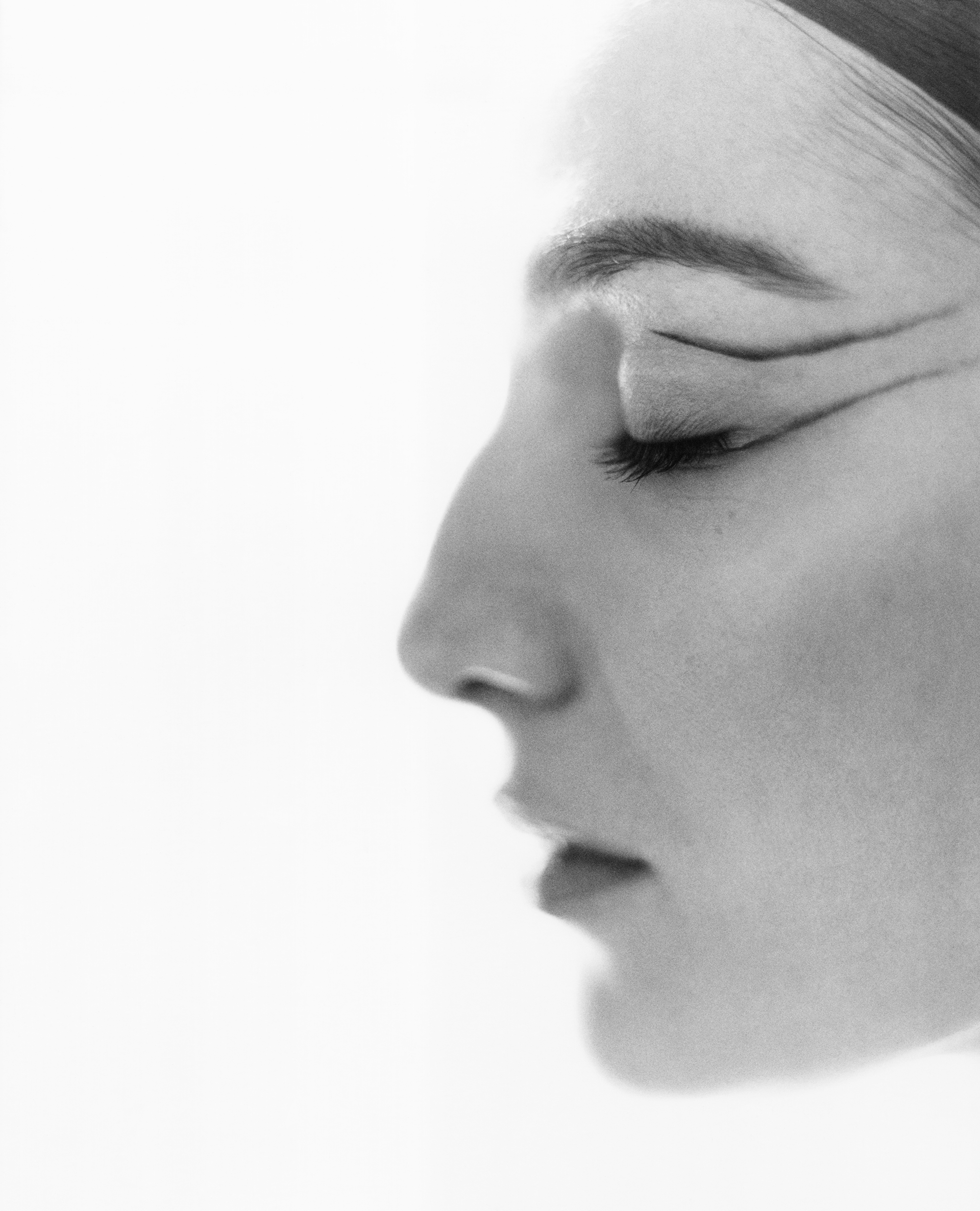
———
Hair: Amidat Giwa at Bryant Artists.
Makeup: Crystabel Riley at Julian Watson Agency.
Nails: Simone Cummings using Bio Sculpture Gel.
Retouching: MCD Creative.
Photography Assistants: Jed Barnes and Grace Tasselli.
Fashion Assistants: Ben Cosgrove and Monica Armario.
Production Assistant: Morgan Shepherd.

